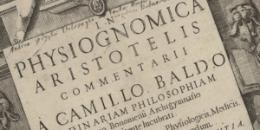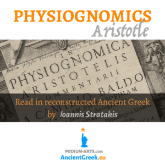• Physiognomics •
• Aristotle •

About “Physiognomics" by Aristotle
Aristotle's Physiognomics (Gr.: Φυσιογνωμονικά) is a treatise on the art of interpreting physical appearances and facial features in order to understand a person's character and personality. According to Aristotle, certain physical characteristics are indicative of specific personality traits, and a person's appearance can reveal their inner nature. For example, Aristotle believed that people with broad faces and large foreheads were more courageous and intelligent, while those with narrow faces and small foreheads were more timid and simple-minded. He also suggested that people with sharp, piercing eyes were likely to be deceitful and cunning, while those with soft, gentle eyes were more trustworthy and honest. Overall, Aristotle's Physiognomics reflects the ancient Greek belief in the close connection between the physical body and the inner soul, and the idea that external appearances can reveal important truths about a person's character and personality. However, it has been criticized for its reliance on superficial physical features and its potential to promote stereotypes and prejudice.
You can follow the text of “Physiognomics” by Aristotle, online at Archive.org with an English translation by W.S.Hett, or at Google Books Teubner Edition's parallel reading of the greek text with a translation in Latin
about Aristotle
Aristotle (Gr.: Ἀριστοτέλης), one of the most important philosophers of Antiquity, was born in 385 BCE in Stageira of Chalkidike. Born in a rich family he had the opportunity to get high education. From 367 BCE on and for about twenty years, he studied philosophy in Athens by Plato and also taught in his Academy. After the death of Plato he moved to the city of Assus in Asia Minor, where he taught philosophy until 345 BCE., when he accepted an invitation by Theophrastus to teach in Mytilene. In 342 BCE King Philippus asked him to teach his 13 years old son, Alexander. After the death of Philippus Aristotle returned to Athens and established the “Lyceum”, where he set his teaching forth. However, after the death of Alexander in 323 BCE and having been accused by opponents for disrespect, he retired in Chalkis. He died in 322 BC from some stomach disease.
Aristotle left a lot of works. The works that have survived are distinguished in logical, physical, biological, psychological, metaphysical, moral, political, technological and various problems.
The Aristotelian works have included the following, which are not considered genuine: Physiognomy, About Miraculous Things Heard, About Colors, Mechanics, Rhetoric to Alexander and On Hearing.
About the audio~videobook
 The recording contains the complete, unabridged Ancient Greek text of the Aristotelian “Physiognomics”. The videobook shows the highlighted Greek text simultaneously with the reading.
After purchase you will be able to download the relevant file(s), containing the work in mp3 a/o mp4 format.
The recording contains the complete, unabridged Ancient Greek text of the Aristotelian “Physiognomics”. The videobook shows the highlighted Greek text simultaneously with the reading.
After purchase you will be able to download the relevant file(s), containing the work in mp3 a/o mp4 format.
You can listen to the first paragraph (1.1) of “Physiognomics”, an audio sample of the present audiobook. Please, click on the play-button bellow and, if you wish, follow the Ancient Greek text lower on the page, or alternatively watch the video, which is provided with a quick translation in English. Thank you!
ΦΥΣΙΟΓΝΩΜΟΝΙΚΑ
Ὅτι αἱ διάνοιαι ἕπονται τοῖς σώμασι, καὶ οὐκ εἰσὶν αὐταὶ καθ᾿ ἑαυτὰς ἀπαθεῖς οὖσαι τῶν τοῦ σώματος κινήσεων. τοῦτο δὲ δῆλον πάνυ γίνεται ἔν τε ταῖς μέθαις καὶ ἐν ταῖς ἀρρωστίαις· πολὺ γὰρ ἐξαλλάττουσαι φαίνονται αἱ διάνοιαι ὑπὸ τῶν τοῦ σώματος παθημάτων. καὶ τοὐναντίον δὴ τοῖς τῆς ψυχῆς παθήμασι τὸ σῶμα συμπάσχον φανερὸν γίνεται περί τε τοὺς ἔρωτας καὶ τοὺς φόβους τε καὶ τὰς λύπας καὶ τὰς ἡδονάς. ἔτι δὲ ἐν τοῖς φύσει γινομένοις μᾶλλον ἄν τις συνίδοι ὅτι οὕτως ἔχει πρὸς ἄλληλα σῶμά τε καὶ ψυχὴ συμφυῶς ὥστε τῶν πλείστων ἀλλήλοις αἴτια γίνεσθαι παθημάτων. οὐδὲν γὰρ πώποτε ζῷον γεγένηται τοιοῦτον ὃ τὸ μὲν εἶδος ἔσχεν ἑτέρου ζῴου, τὴν δὲ διάνοιαν ἄλλου, ἀλλ᾿ ἀεὶ τοῦ αὐτοῦ τό τε σῶμα καὶ τὴν ψυχήν, ὥστε ἀναγκαῖον ἕπεσθαι τῷ τοιῷδε σώματι τοιάνδε διάνοιαν. ἔτι δὲ καὶ τῶν ἄλλων ζῴων οἱ περὶ ἕκαστον ἐπιστήμονες ἐκ τῆς ἰδέας δύνανται θεωρεῖν, ἱππικοί τε ἵππους καὶ κυνηγέται κύνας. εἰ δὲ ταῦτα ἀληθῆ εἴη (ἀεὶ δὲ ταῦτα ἀληθῆ ἐστίν), εἴη ἂν φυσιογνωμονεῖν.
